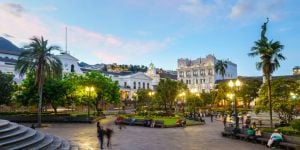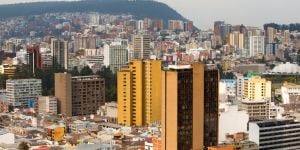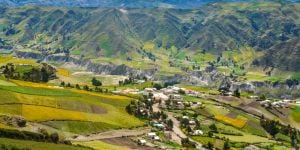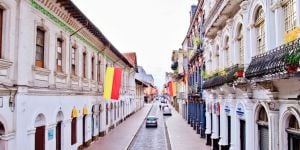Diesel pollution from the buses in the larger cities
Last activity 28 September 2015 by j600rr
5697 Views
77 replies
Subscribe to the topic
Post new topic
I am interested in finding credible sources that can speak to or offer reports on the diesel pollution from the buses in the larger cities. I would like to offer potential solutions to this and need to know more about the extent of the problem first. I want to find details on health and environmental issues as well as effects on quality of life. I am researching this heavily and am seeking help in the matter. Thank you.
I'm not sure where you'd find these kind of statistics. Perhaps the Minister of Health.
I've read some stats that rank Quito as the 11th most polluted city in the world. I'm not sure why, but it's elevation is cited as a factor.
Ecuador is a poor country nearly completely indebted to China so getting a fleet of green busses is not likely to happen soon. As well taxis are cheap
rjwagner wrote:I am interested in finding credible sources that can speak to or offer reports on the diesel pollution from the buses in the larger cities. I would like to offer potential solutions to this....
I want to find details on health and environmental issues as well as effects on quality of life.
Implemented solutions are needed!
This is the worst problem that I continually see in Quito. It's evident and obvious -- city buses spewing black exhaust on an ongoing basis.
My apartment is over a bus route on an incline in El Centro, and I usually open my windows only at night after a good rain.
The situation is exacerbated for Expats and others by the fact that the city altitude is over 9,300 feet, meaning that breathing is already more challenging than in most places worldwide.
Bus pollution is the shame of Quito.
cccmedia in Quito
Buses would not have to change. There are much cleaner fuel options that would offer a considerable change to the emissions. My research involves the viability of application of an available cleaner fuel technology without a dramatic change in the current infrastructure. The cleaner fuel technology also offers additional benefits aside from the bus pollution. Thanks for the posted reply. I do have a good start on stats but want to gather as much information as possible.
Is such a cleaner fuel option financially viable?
Would it affect the struggling EC oil industry?
I understand that you are laying groundwork, but it seems like you may have some tentative ideas or conclusions about these important questions.
cccmedia in Quito
Here in Cuenca the bus owners state that they are unable to make the needed repairs until the fare is raised. I suspect until pollution standards are enforced on all commercial vehicles there will always be this type of pollution and economic reasons cited as to why it can"t be done a this time.
Not necessarily tentative conclusions. I am in such a position that I cannot discuss details on a forum such as this. For now the discussion must remain somewhat general due to commitments underway. Thank you for your replies. I really believe that this could be of great benefit to Ecuador. That being said, time will tell. Thanks again.
rjwagner wrote:Not necessarily tentative conclusions. I am in such a position that I cannot discuss details on a forum such as this. For now the discussion must remain somewhat general due to commitments underway. Thank you for your replies. I really believe that this could be of great benefit to Ecuador. That being said, time will tell. Thanks again.
Amazing that no one has introduced this to Ecuador previously, or if it was it was previously rejected. No extra cash around presently.
The Ecuadorians probably just accept it as a fact of life. I'm sure they don't think about the effects on their health. China is their main economic support/ lender. Think of the pollution in China
It would be really great if something could be done.
If you care to send private messages that don't appear on the Forum click on the envelope icon top right of this page in the green banner or click on the avatatar of whoever you might want to respond to and it will bring you to a screen that will direct you how to send a message.
Keep us posted 
suefrankdahl wrote:Keep us posted
I second this motion from the Oracle of Oregon.
This is a major health issue in Ecuador's largest cities, and apparently technology exists to remediate it.
I noticed today that the per-unit cost of diesel at a Quito gas station is only $1.03, lending credence to the concept that super-cheap fuel may be a major contributing factor in polluting Quito's air.
cccmedia in Quito
There's a glut on the market. Gas has been less than $3/gal all summer so far, here in the States. Usually it starts to go up on Memorial Day peaks around the Fourth of July and comes back down after Labor Day.......Hmmm....figure that out without the Oracle having to tell you 
I have some input on this issue.
There are a number of issues I can see happening here. Due to the new technology and increased emission standards, the newer buses have several built in controls to regulate the emmisions produced.
Firstly the quality of diesel fuel in Ecuador as well as many SA countries is of very low quality. This results in more wear on the engine and boosts maintenace costs, and produces more exhaust gases which are dirty.
The newer buses are very different in comparison to units built 20 years ago. The theory then was higher engine RPMs or revolutions per minute equaled more torgue or usable power to the road. Due to the new technology and the integration of electronic engine controls the engines now offer more torgue or power at lower RPMs and are designed to be driven that way.
This means when you drive one the built in controls will actually prompt you to use a lower more efficient gear using less engine RPMs, this also keeps the engine cooler and produces cleaner exhaust gases.
When you see a bus blowing thick black smoke, what you are seeing is unburnt fuel and carbon particles that are forced out of the engine. This is bad. This happens for a couple of reasons, the driver is flooring the accelerator to achieve maximum power and or the unit has been tuned to run rich, meaning more fuel to produce more power. These actions defeat the purpose of the new controls.
Also if the drivers are not trained and aware of these controls and how they work, they will over drive the unit burning more fuel, creating more heat and more exhaust with no practical result. If you look you will see that some buses have a low exhaust signature, light gray smoke, while others have thick black smoke. Both are bad to inhale the latter the worst for reasons explained above. I don't want to imply emissions here are a joke or not followed as should be but the proof is in the exhaust..
Speaking with a fellow Expat and friend, Journeymanjack he educated me as to the trend in EC for a commercial driver. Here as in the U.S. a CDL or commercial drivers license is required. However it has only been in recent years that EC pushed a training program. The operators who have been on the road for years may very well have used a work around to maintain their CDL, while the recent ones have hopefully had some form of training. This still does not mean that a majority of the operators are familiar with the new technology and how to use it properly.
I've spoken to dozens of taxi drivers in Quito over time, discussing the bus pollution problem.
None of them disputed that a problem exists. None of them seemed too concerned.
I don't doubt that a major part of the problem is super-cheap fuel.
The problem seems accentuated here in Centro Historico, Quito, as the area is hilly and drivers are accelerating, stopping, accelerating on inclined streets.
cccmedia in Quito
Took the words right out of my mouth CCC and I've never been there
I said it in my first. post that they've kind of accepted it as a fact of life with no idea what it may doing to their lungs reiterating CCC's remarks. Wonder if our researcher rj wagner has found some useful health stats. Think maybe hospital admissions for exacerbations of chronic lung diseases (COPD) might be a place to look. Also asthma.-
Correa has bigger fish to fry right now. Think it's pretty unsure what might happen with the increase in anti gov't protests. Didn't he back down on the tax thing? Just curious if there are any potential contenders for the job should he decide to step down with a halfway decent reputation intact. They say a new broom sweeps clean and if this technology exists and is inexpensive maybe consciousness could be raised
. Take care guys. The warnings may be exaggerated but I wouldn't write them off. CCC risked his life for us to be in hope to see the pope crowd. There was mention here that they might be headed for Centro Historico. I would hate to lose my main source in Quito
The lack of concern that CCC encountered speaks to the fact that there may not be as much eco consciousness in EC cities.From what I see on the galaxy street view maps of Quito there are not a lot of green spaces or trees. Am sure there are lots of parks .Just haven't found them. Don't know the right avenidas or addresses to look up.
Spilling oil in the jungle was something that didn't rise to a level of concern to follow thru with the clean up after Texaco was done with their part. Read somewhere that there was some kind of scandal and that it got swept under the rug.
There is a documentary film maker that is planning to expose the problem. El Presidente was not too happy about it.
Do you know any of the facts on the whole thing CCC?
Is Mariscal the tourist area? Bet those busses spewing black smoke don't run by those outdoor cafes.
Doesn't EC have the greatest biodiversity of species in the world? Part of attraction for the eco tourists. Given those State Dept warnings it might discourage some of them. Think those funky old busses might turn me off now that I know about them
Hey mi amigo GMC the safety expert..... is it any kind of of a safety issue riding around in busses they can't afford to maintain properly. TWENTY year old busses.... the engine is one thing ...what about the brakes and the steering?????
Signed
The Oracle of Oregon with hopefully not too stupid questions  ......
...... 
Few links for anyone that feels like doing a little reading. Some positive steps in the right direction in terms of environment, and pollution in Ecuador, and Latin America. Of course the question would also be how many of these changes will actually be followed thru with, and or even implemented?
http://www.ngvjournal.com/latin-america … -vehicles/http://www.worldbank.org/en/news/featur … -reductionhttp://www.unep.org/transport/pcfv/PDF/Retrofit.pdf
Thanks to all for the information and comments concerning the pollution problem. This is all very helpful to me. I appreciate it!
The problem we face, RJ, may be that la gente needs to be persuaded that cheap one-dollar fuel is not worth the health hazard it is producing.
Alternatively, to find a way to produce/obtain low-polluting fuel at a competitive (read: equivalent) price.
cccmedia in Quito
Regular maintenace is a must in any fleet application. A bus being over tuned to run rich, under the assumption of having more power is a sign of how the general maintenance attitude may be.
In the U.S. it is required that a driver/operator perform an inspection of the unit prior to leaving the yard. These checks range from fluid levels, water traps for air systems, tire pressure, signals, etc. Not only does this maintain the unit in good working condition but also provides a safety check of the bus.
There are many newer model buses in use in Quito as well, time will tell if they remain in factory working order. They are easy to spot as they are the ones that do not have the thick black exhaust yet.
As far as fuel quality goes there are already substitutes for low sulfur diesel available. Biodiesel is popular and is made from various peanut oils, and one I heard of one that is made from coconut oil, that would be something, a bus that smells like the Caribbean. Cost is the driving factor as many vehicles today are flexfuel capable, meaning they can use either, bio or petroleum fuels.
Could Ecuador do it? yes. Should they do it? Yes. Will they do it, probably not, one issue I have not heard Correa talk about is the smog problem and the subsequent health problems. Google diesel exhaust, and you will hold your breath from now on, that I can garuntee.
The reason diesel exhaust is so much worse than normal gasoline is that in a diesel engine there are no bujias, spark plugs. The heat generated from the compression of air is what ignites the fuel in a diesel engine. The problem is that the valves in the engine which open and close to let in air and remove exhaust do not stay closed long enough due to the timing of the engine that the fuel cannot completely burn. This is where the black smoke comes from, as stated previously it is unburnt fuel and carbon particles.
Diesel fuel burns slower and at a lower temperature than gasoline, which is one reason is was adopted for use on ships. The reaction in a diesel engine is violent on the power stroke, which is where the familiar diesel sound comes from. The internal pressures are far higher than a gasoline engine which is why a diesel is so heavy duty, if not it would tear itself apart.
Okay, probably much more than the average user cares to know about a diesel engine.... Yet another file in the hardrive of my mind.
GMC out..
GMC(SW) wrote:Could Ecuador do it? Yes. Should they do it? Yes. Will they do it, probably not, one issue I have not heard Correa talk about is the smog problem and the subsequent health problems. Google diesel exhaust, and you will hold your breath from now on, that I can guarantee.
Don't even need to google that. I'm already holding my breath when I see the black exhaust, and telling my taxi drivers to avoid the worst problematic buses and vans. They cooperate because they're on the road all day, and they get it !
Good job educating us, GMC. 
cccmedia in Quito
GMC(SW) wrote:As far as fuel quality goes there are already substitutes for low sulfur diesel available. Biodiesel is popular and is made from various peanut oils, and one I heard of one that is made from coconut oil, that would be something, a bus that smells like the Caribbean. Cost is the driving factor as many vehicles today are flexfuel capable, meaning they can use either, bio or petroleum fuels.
Glad you brought this point up. Brazil already has a sugar ethanol alternative. Almost every vehicle in Brazil has the alternative to use gas, diesel, or ethanol when they fuel up. There was actually a push in the 70's in the u.s. when we had the oil crisis to push towards alternative cleaner burning fuels like biodiesel, but we never followed through. Good point about flexfuel capable cars. Most people don't realize that, but yes most of today's cars can run on different fuel mixes. There is also potential hope for algae biofuel, but right now the cost is still way too high to be practical, but am hopeful in the future we can bring that cost down.
Would recommend this documentary for anyone who has the available time, and has interest in a bit of the history of oil, and alternative fuels. Is about 90 minutes long.
https://www.youtube.com/watch?v=noQHgIHnWVI
Thanks for the link that documentary is worth the 90 minutes. The sad thing about all this is that there are, more than enough substitutes for petroleum-based fuels. We have the technology to completely go without it and have for some time. The problem is that to many people have made to much money for to long and will not let it go. As it stands the petro dollar rules, and will be fought for as it has been for years.
It is a hard truth to admit but, it was clear to me on several operatons while in the Military that the regional stability we fought and died for was in reality, to ensure the stability of the petroleum assets in the area. If back in 1933 they could have just found the water they searched for in the Wahabi desert and not oil, Aramco would not exist and so many would not have lost thier lives for a form of fuel we don't even realy need.
I don't know who said it, but the phrase Man is like a cancer is true. We inhabit a fertile area, use up all the resources, and afterwards move on leaving scorched earth and pollution in our wake. The planet cannot sustain these actions for ever, and at some point it will fight back.
GMC(SW) wrote:Thanks for the link that documentary is worth the 90 minutes. The sad thing about all this is that there are, more than enough substitutes for petroleum-based fuels. We have the technology to completely go without it and have for some time. The problem is that to many people have made to much money for to long and will not let it go. As it stands the petro dollar rules, and will be fought for as it has been for years.
It is a hard truth to admit but, it was clear to me on several operatons while in the Military that the regional stability we fought and died for was in reality, to ensure the stability of the petroleum assets in the area. If back in 1933 they could have just found the water they searched for in the Wahabi desert and not oil, Aramco would not exist and so many would not have lost thier lives for a form of fuel we don't even realy need.
I don't know who said it, but the phrase Man is like a cancer is true. We inhabit a fertile area, use up all the resources, and afterwards move on leaving scorched earth and pollution in our wake. The planet cannot sustain these actions for ever, and at some point it will fight back.
Trying to keep this from being politcal, and more about trends or movements, and the potential they could have. It will be interesting to see just how big of an impact the current progressive movement which is starting to gain large momentum in the u.s. will have on the above points you made? I think that while not talked about much in the mainstream media, the explosion of popularity for Bernie Sanders could really start to shake things up, but I fear you may be right about petro dollars, and their power, and influence being almost impossible to break up.
GMC(SW) wrote:It is a hard truth to admit but (if) back in 1933 they could have just found the water they searched for in the Wahabi desert and not oil, Aramco would not exist and so many would not have lost their lives for a form of fuel we don't even realy need.
Amen.
Mr. "Mission Accomplished" and his foreign/military policies didn't help.
cccmedia in Quito
Thank you for the link to the documentary. Being aware of the majority of history as laid out in the 90 min. piece, I found the software portion to be quite interesting. Conversion has long been available. However, the fact that a simple hack of the software in 1996 and newer vehicles displaces the argument of a complete infrastructure change having to take place. While the viability of electric cars is a ways out, converting to a cleaner fuel has always been within reach. Thanks again.
rjwagner wrote:Thank you for the link to the documentary. Being aware of the majority of history as laid out in the 90 min. piece, I found the software portion to be quite interesting. Conversion has long been available. However, the fact that a simple hack of the software in 1996 and newer vehicles displaces the argument of a complete infrastructure change having to take place. While the viability of electric cars is a ways out, converting to a cleaner fuel has always been within reach. Thanks again.
You are welcome. Thought it was a pretty interesting documentary. Yes, converting to a cleaner fuel could be done fairly easily. It would be a step in the right direction, but is unlikely to ever happen.
All very well said, profits over people. While there's a way there's no political will.
All the scientific research, existing technology and potential advancements aren't worth a hill of beans. All pie in the sky dreams Not even worth discussing until you can convince the world's leaders,biggest offenders and oil corporations that life, health and a clean place to live are a good investment. Seems so simple.. Takes a long time to raise consciousness in the US. We are a car culture and don't feel we need to set a good example for the world. Just tell everyone what they're doing wrong and how to do it right. You should read some of the Al Jazeera opinion pieces
Hate to say it but it's too late for lots of places in the world.
Read an article, I think National Geo about an Alaska Native town Togiak that can no longer live the subsistence lifestyle. All of their food sources deer, fish, seals are no longer available because of the effects of global warming and they've never even heard of it.
.
J 600's second article which discussed Ecuador says it all, no money, poor infrastructure and their oil being in the Amazon. If anyone really cared about perhaps the most bio diverse country on the planet they would do something about helping to sustain it. And of course one must consider who their benefactors are. And how very little they care about there own citizens. Had read there were some reforestation being done in the Amazon Forest
While I don't want to get political either it is a very sad statement that this administration efforts and those of his predecessors about implementing green energy technology and blocking emissions are and have been so poorly received.
That there are candidates running for president in this country that won'.t publicly admit the problem exists is also a very sad statement. That the whole thing has turned to theater and you can't afford to play unless someone is bankrolling you. is also not hopeful. And the billionaires, not even worth talking about
The mainstream media I read and the TV I watch celebrate the breath of fresh air Bernie Sanders has brought to this election cycle. "Authentic" ...what a concept. Let's just call him a humanist. Socialism is something only enjoyed in the modern European societies. decent health care, child care, a living wage, vacations and pensions
.Being progressive is a good thing. Can you swallow the new euphemism for liberal? Those of us that are not entrepreneurs, investors or living off of our interest sitting around surfing the net and being naysayers about the possibility of saving the planet. If you're not part of the solution you're probably part of the problem.
Anyway I live in a green state where there were credits on my gas bill every month . I only pay electric and the percentage of wind and solar used are also recorded on the bill And Greenpeace comes and hangs off bridges and kayaks surround ships trying to get back up to AK to start the latest Shell drilling. The ship actually had to turn around.
Well, can't say us happy hippie Boomers didn't warn you. Good luck .It's your problem now.
Shame what happened to Al Gore. Things could have turned out so differently
rjwagner wrote:Thank you for the link to the documentary. Being aware of the majority of history as laid out in the 90 min. piece, I found the software portion to be quite interesting. Conversion has long been available. However, the fact that a simple hack of the software in 1996 and newer vehicles displaces the argument of a complete infrastructure change having to take place. While the viability of electric cars is a ways out, converting to a cleaner fuel has always been within reach. Thanks again.
Tesla... pretty hard to deny their viability with a straight face.
It is true that their product is a very good creation. My reference was more toward the economics. The affordability for most that may want to switch is a ways out along with the infrastructure that is necessary. Larger metro areas could benefit greatly. Expanding outside of the metro areas will take some time. Thanks for the comment.
Why don't we have decent public transportation like the rest of developed world?
suefrankdahl wrote:Well, can't say us happy hippie Boomers didn't warn you. Good luck .It's your problem now.
I must swallow my words, and apologize to you boomers that I demeaned on a previous thread. You were right Sue. As were many of your generation. One can only wonder what would have happened, if only we would have implemented and advanced Jimmy Carters energy policy?
I agree with you RJ about the economic viability of taking the steps toward alternative fuels, or we should at least have the option of multiple fuels whe we go to fill up. Problem with alternative fuels, and alternative energies is we have become such a divisive, and gridlocked country. Those who support solar try and steer people away from wind. Wind tries to steer people away from solar. Oil and gas tries to steer people away from bio-fuels, and other alternative energies. Each group wants all the research money into their fields, and the big money investors in some of these companies don't want any competition from competing fields. Note when I say "those who support", am referring to special interests, not the average citizen.
History shows where things turned around in the U.S.A. with regards to mass transit. The previously mentioned documentary did a good job of addressing this. What once was a great infrastructure many years ago -- was confiscated in a way to make room for a new profit center.
https://www.youtube.com/watch?v=noQHgIHnWVI
Very interesting video....so Rxxx is no longer around conspiring to end mass transit.... then who is now.?...or make the public aware of these simple computer fixes and devices....Oxxx is manipulating the oil market to keep the US out of production....and it did explain the forces in the market keeping these biofuels relatively unavailable....hate to think it is the big oil lobby affecting our legislators....as I said profits over people.....and politicians more interested in staying in power than doing something for their constituents.
And what about the current state of our infrastructure?.....Is it political gridlock?......Weren't some of these bridges built in the 30's as part of the WPA program.....and then when we find ourselves in "The Great Recession".....proposals made to do something about it are met with incomprehensible resistance.....the spectre of the evils of "socialism" was not an issue for FDR. I've lived in two states where sections of bridges have literally fall into the river
Documentaries like this aren't blockbusters and don't get nominated for Academy awards for a reason I'm afraid.
I drive an eleven year old car that is and has been well maintained. Right now it costs less than $30 to fill and still gets the same great gas mileage it did when it rolled off the factory room floor
I guess reversing the mentality of the American car culture is never going to happen. I lived off the grid for ten years. When I came back to the lower 48 in 2004 I was and still am completely amazed that people are able to find their cars in a parking lot. I never saw so many silver cars that looked so similar and are most frequently involved in accidents because of the color. I guess that's why one of the latest bell and whistle invented was the clicker that flashes your lights or beeps your horn.
The last time I had to rent a car the controls for the lights, turn signals and windshield wipers were so out of the way the Hertz attendant had to show me where they were. I never totally understood how the heat and fan worked. And where the radio should be was some kind of a lighted screen with moving images. I didn't even bother trying to turn that on figuring I'd kill myself for how long I'd have to take my eyes of the road.
They say you can sell the American consumer anything
What appears to be black smoke from the diesel busses in Cuenca and Quito is not smoke at all. At the altitudes in Cuenca and Quito, the lower oxygen level cause the engines to run rich and what you are seeing is unburned diesel fuel which is heavier than air and drops to the ground in seconds. Unfortunately Cuenca Transit does not own the busses, they are owned by a number of private bus companies and Cuenca Transit has not been able to require that the private companies install computerized engine controls which would solve the problem. Even the new red busses emit the same unburned fuel.
Rockysroad wrote:What appears to be black smoke from the diesel busses in Cuenca and Quito is not smoke at all. At the altitudes in Cuenca and Quito, the lower oxygen level cause the engines to run rich and what you are seeing is unburned diesel fuel which is heavier than air and drops to the ground in seconds. Unfortunately Cuenca Transit does not own the busses, they are owned by a number of private bus companies and Cuenca Transit has not been able to require that the private companies install computerized engine controls which would solve the problem.
Saying that the black stuff being belched from EC buses "is not smoke" doesn't change the fact that the fuel is the cheap kind and the air is being poisoned.
The stench is in the air regardless of whether the black junk drops to the ground.
If the transit companies can't require a known solution, who can?
cccmedia in Quito
cccmedia wrote:The problem we face, RJ, may be that la gente needs to be persuaded that cheap one-dollar fuel is not worth the health hazard it is producing.
Alternatively, to find a way to produce/obtain low-polluting fuel at a competitive (read: equivalent) price.
cccmedia in Quito
Sorry CCC, but good luck on the idea of persuading them. Even in Canada, where people are more health conscious, most people choose the least expensive fuel to burn in their cars regardless of the health concerns. I doubt it will, unfortunately, be any different here.
Rockysroad wrote:What appears to be black smoke from the diesel busses in Cuenca and Quito is not smoke at all. At the altitudes in Cuenca and Quito, the lower oxygen level cause the engines to run rich and what you are seeing is unburned diesel fuel which is heavier than air and drops to the ground in seconds. Unfortunately Cuenca Transit does not own the busses, they are owned by a number of private bus companies and Cuenca Transit has not been able to require that the private companies install computerized engine controls which would solve the problem. Even the new red busses emit the same unburned fuel.
It might drop to the ground in seconds where there is no air current. But most times there is other vehicular traffic and sometimes wind that stirs up the particulate matter back into the air. So, it doesn't always stay on the ground. That means that some of it may be inhaled.
My son-in-law is a diesel engineer Cummins in the US, who speaks Spanish and he was here for a visit about 1.5 years ago. We went to Cuenca Transit and the head engineer said the computer controlls on the the engine would get rid of 90% of the problem. Depending on the age of the engines, it can cost up to $5k per engine and Cuenca Transit has not been able to get the government to require the controls. Poor quality fuel is not the problem, diesels will run on anything.
Cummins as well as all engine maufacturers since 1975 have used an ECM electronic control module, and numerous sensors to control engine emissions. A Cummins diesel engine also has a module which controls fuel delivery, and they have for some time. The purpose of these modules in simple terms is to monitor and control engine timing and fuel in the engine. Many other engine systems and environmental factors are monitored also. Mainly for emissions purposes, the cleaner the engine runs with these systems the better.
This is not an add on feature, but a part of the engine control system, which has been around for some time now. The OBD onboard diagnostic system which is a part of the ECM system was intended for the control of vehicle emmisions. There is an add on system for diesels, which is an after exhaust cleaning system which injects a solution into the exhaust to neutralize the exhaust gases. Automobiles have used the ECM along with a catalytic converter to reduce emissioms in exhaust since the early 70's..
The result of any, cumbustion process results in smoke. With a diesel engine, due to the timing of the intake and exhaust valves not allowing complete burn of the fuel the result is the black or grey smoke which is leftover unburnt fuel well as other exhaust gases from the combustion process. Yes it does fall to the ground quicker due to the mass of the particles being pushed out, the exhaust cleaning system also aides in this.
It has been a trick used by some mechanics, to advance the engine timing to provide more power, which resulted in more and blacker exhaust. However, the newer engines, working on the priciple of a diesel engine, make more power at lower engine speeds RPM revolutions per minute. Having said that, an engine built in the last few decades with the ECM system, which is required. The ECM will not allow these types of changes, and will even control the speed the engine will make in any certain gear. It will retard the engine to maintain emissions.
Altitude is a factor for any engine, which is one reason that automobiles have for some time had electronic control systems which monitor barometric pressure, humidity and other factors to allow the engine to run effiently, and prevents the need to have the engine tuned at every altitude change. Anyone who has ever driven from the coast to the mountains has seen a drop in performance. Especially in an older car that only has a distributor to control engine timing. A quick, and very small turn of the distributor, and you were back in business.
While it is true that a diesel will run on many fuel sources, this is not a prectical solution as many fuels leave deosits and residue in the engine which is a maintenance issue. Even the ULSF, ultra low sulfur fuel disel fuel which is reccommended leaves deposits. Even the ULSF is to consist of less than 15 ppm, parts per millon of sulfur, a standard hard to meet for many countries.
Almost every advance in automotive engineering in the past few decades has been to reduce fuel emissions. This is very apparent if you look under the hood at an engine from the late sixties and compare with an engine of today. In the older car, all you see is the engine and basic systems used for cooling, steering etc. In a newer car the engine is hardly identifiable as it is covered with hosses and wiring running to all sorts of sensors, monitoring almost every engine funtion. All the advances in efficiency and performance have taken a back seat to emmisions.
I appologise for the post length, it was needed for clarity.
For those who are curious, here is the data on that black stuff normally called soot, or smoke from a diesel engine.
This is a list of chemical components that have been found in diesel exhaust.
Contaminant Note Particulate extract mass concentration
acetaldehyde IARC Group 2B carcinogens
acrolein IARC Group 3 carcinogens
aniline IARC Group 3 carcinogens
antimony compounds Toxicity similar to arsenic poisoning
arsenic IARC Group 1 Carcinogens, endocrine disruptor
benzene IARC Group 1 Carcinogens
beryllium compounds IARC Group 1 Carcinogens
biphenyl It has mild toxicity.
bis(2-ethylhexyl) phthalate endocrine disruptor
1,3-Butadiene IARC Group 2A carcinogens
cadmium IARC Group 1 Carcinogens, endocrine disruptor
chlorine Byproduct of Urea injection
chlorobenzene It has "low to moderate" toxicity.
chromium compounds IARC Group 3 carcinogens
cobalt compounds
cresol isomers
cyanide compounds
dibutyl phthalate endocrine disruptor
1,8-dinitropyrene Carcinogen[citation needed]
dioxins and dibenzofurans
ethylbenzene
formaldehyde IARC Group 1 Carcinogens
inorganic lead endocrine disruptor
manganese compounds
mercury compounds IARC Group 3 carcinogens
methanol
methyl ethyl ketone
naphthalene IARC Group 2B carcinogens
nickel IARC Group 2B carcinogens
3-Nitrobenzanthrone One of the strongest carcinogens known 0.6 to 6.6 ppm
4-nitrobiphenyl 2.2 ppm
nitrogen oxides
phenol
phosphorus
polycyclic organic matter, including polycyclic aromatic hydrocarbons (PAHs)
Pyrene 3532–8002 ppm
Benzo(e)pyrene 487–946 ppm
Benzo(a)pyrene IARC Group 1 carcinogen 208–558 ppm
Fluoranthene 3399–7321 ppm
propionaldehyde
selenium compounds
styrene IARC Group 2B carcinogens
sulfur compounds
toluene IARC Group 3 carcinogens
xylene isomers and mixtures: o-xylenes, m-xylenes, p-xylenes IARC Group 3 carcinogens
Definitely gives you something to think about.
Articles to help you in your expat project in Ecuador
 Food in Ecuador
Food in EcuadorWhat kind of food will you find in restaurants, cafes, and private homes in Ecuador? Many restaurants in Ecuador ...
 Work in Ecuador
Work in EcuadorEcuador is famous as a retirement haven. But you might not want to wait until retirement age to move there and ...
 Healthcare in Ecuador
Healthcare in EcuadorEcuador, as a fast-developing nation, has laws that are constantly evolving, but one thing is certain: the ongoing ...
 Opening a bank account in Ecuador
Opening a bank account in EcuadorA few years back, an expat would just breeze into an Ecuadorian bank, flash their passport and a bank account ...
 Family and children in Ecuador
Family and children in EcuadorFamily is everything to an Ecuadorian. The extended family unit is the most important aspect of life in Ecuador, ...
 The Working Holiday Visa for Ecuador
The Working Holiday Visa for EcuadorEcuador is truly a paradise for adventure and nature lovers, and thanks to the Working Holiday Visa program, they ...
 Permanent Residency in Ecuador
Permanent Residency in EcuadorEcuador is calling and you are ready to go and experience all that this gorgeous country has to offer. However, ...
 Work in Cuenca
Work in CuencaThere is no doubt that the Spanish colonial city of Cuenca is a wonderful place to call home, as demonstrated by ...
Find more topics on the Ecuador forum



